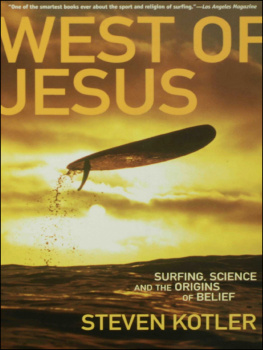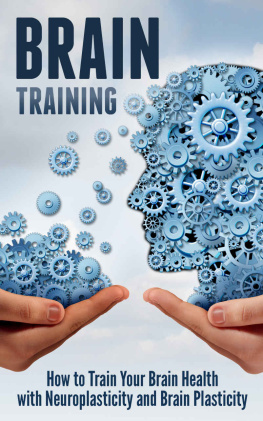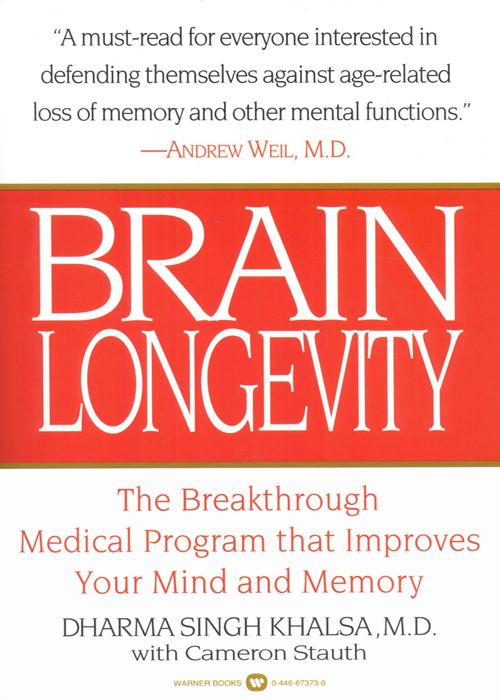BRAIN LONGEVITY. Copyright 1997 by Dharma Singh Khalsa, M.D., with Cameron Stauth. Introduction copyright 1999 by Dharma Singh Khalsa, M.D. All rights reserved. No part of this book may be reproduced in any form or by any electronic or mechanical means, including information storage and retrieval systems, without permission in writing from the publisher, except by a reviewer who may quote brief passages in a review.
Warner Books
Hachette Book Group
237 Park Avenue
New York, NY 10017
ISBN: 978-0-7595-2042-4
A hardcover edition of this book was published in 1997 by Warner Books.
First eBook Edition: January 2001
Visit our website at www.HachetteBookGroup.com.
DHARMA SINGH KHALSA, M.D., graduated from Creighton University School of Medicine and trained at the University of California at San Francisco School of Medicine, Harvard Medical School, and UCLA School of Medicine. He is Board Certified by the American Academy of AntiAging Medicine, of which he is also a founding member.
CAMERON STAUTH is the author of nine critically acclaimed books, a former editor in chief of the Journal of Health Science,and a journalist who has written more than a hundred articles for the New York Times Magazine, Prevention, Natural Healthand other publications.
I believe that Alzheimers disease can be delayed and prevented. I believe that age-associated memory impairment can be eradicated. I believe that people in their forties, fifties, sixtiesand beyondcan retain not only an almost perfect memory, but can have youthful minds, characterized by the dynamic brain power, learning ability, creativity, and emotional zest usually found only in young people. Ten years ago, almost no one in medicine subscribed to these ideas; I certainly didnt. But now Im positive theyre true.
from Brain Longevity
A wonderfully sensible regimen. A charming bookside manner. An accessible, smart guide to living a healthier life.
Publishers Weekly
BRAIN LONGEVITY reveals the brains vulnerability to physical abuse and stress, as well as its incredible ability to revitalize and regenerate.
Light Connection
Finally, a practical solution to the problem of brain aging in the baby boomer age wave. This is one of the few books that can actually change your life.
Ken Dychtwald, Ph.D., author of Age Wave
Khalsa presents his case in calm, medically persuasive prose.
Fort Lauderdale Sun-Sentinel
[BRAIN LONGEVITY] uses medicine, science, and spirituality to educate, inspire, and point the way to a more hopeful future.
Tacoma News Tribune (WA)
BRAIN LONGEVITY covers all the technical bases, yet is easy to read and readily accessible to members of the lay public. Reveals that brain-specific nutrients, pharmaceutical medications and exercise, combined with yogic mind-body exercises and other protocols, have a synergistically powerful effect on improving brain function.
Life Extension Review
BRAIN LONGEVITY is well written, easy to understand, and inspiring. Its simple presentation of technical material makes it a great book for cognitive enhancement novices. Its presentation of a balanced program provides some food for thought for the smart-drug aficionado. Its passionate call for a wise old age of continued productivity is a missive I think none of us baby boomers should miss.
Smart Drug News
This book is the product of the hard work and the vision of many people. Beyond that, it is the result of blessings and grace.
I would like to first thank my teacher, Yogi Bhajan, for his strength, his guidance, and his infinite love.
When it comes to hard work, I must salute my co-author, Cameron Stauth. He never wavered in his work ethic or intensity. His obsession with creativity and quality is impeccable.
Cam and I also wish to thank Maureen Egen, editor of this book, for her enthusiasm, her ideas, and her dedication to this long and arduous project. Maureens insight, as well as that of Laurence Kirshbaum, CEO of Warner Books, was clear right from the start. To them and all their great staffincluding Jackie Joiner, Harvey-Jane Kowal, David Smith, Karen Torres, Bruce Paonessa, Debbie Stier, and Martha Otiswe say thank you.
The vision of our agent, Richard Pine, of Arthur Pine Associates, exceeded even our own. He was instrumental in the creation of this book, and we will always be grateful for his important contributions. Id like to thank Sabine and Andrew Weil, M.D., for directing me to him. Arthur Pine was also very encouraging and his advice, as always, was astute.
My personal thanks go out to Hal Zina Bennett, Ph.D., who helped me tremendously in the preparation of the initial proposal. Id like also to thank and acknowledge Jerry M. Calkins, Ph.D., M.D., for his ongoing support, and Somers and Susan White, for their friendship and wise counsel.
Many other people were also of great help, including Jeanne Withrow, Meaghen Porte, Sandra Stahl, Nicole Hunscher, Joanne Yearout, Goldie Vickers, and Diane Paulson.
My heartfelt love and thanks to my wife, Kirti, who worked with me around the clock to bring our vision to fruition, and to the rest of my family: Hari, Sat, and Ethel.
The authors would also like to gratefully acknowledge the many physicians and scientists who generously cooperated with our research efforts. We especially want to express our appreciation to the patients who agreed to tell their stories in
Since the publication of the hardcover edition of Brain Longevity in May 1997, I have received many letters, faxes, and e-mails from people all over the world about how much they appreciate the book. In fact, this has led me to develop a series of three-day seminar consultations in Tucson, Arizona, in which we continue to prove that it is possible to not only combat brain aging but also enhance all levels of cognitive function and impact Alzheimers disease. For that I am eternally grateful.
As discussed in Brain Longevity,the key to understanding the program is to realize that your brain is flesh and blood like the rest of your body. And it will respond to lifestyle measures you take to strengthen it. If you can recognize the power that the integrated medical approach has on the whole brain, not just on one isolated chemical or gene, it becomes clear why the program is so successful.
The program presented in Brain Longevity was well ahead of its time. Since then, however, additional scientific research and clinical studies have added to our knowledge. I would like to share some of this new work in this introduction, as well as preview a few key principles in the book.
The Brain Longevity Diet
The fifteen- to twenty-percent fat, nutrient-dense diet recommended in the book has recently been confirmed by two new exciting research projects. The first is an extension of the work by Roy Walford, M.D., and his colleagues in Biosphere II, which is discussed in chapter 11. The diets anti-aging benefits are very powerful because they help lower your blood cholesterol and lipids. This is very beneficial for long-term brain function.
The most dynamic research in this field was done by William B. Grant, Ph.D. He is a NASA scientist who has the interesting job of traveling to exotic locations around the world to study such environmental conditions as global warming. When Dr. Grants mother developed Alzheimers he became inspired to try and spare others the pain of watching a family member suffer. He therefore began investigating the link between Alzheimers and nutrition. While reviewing the literature of the World Health Organization, he discovered that the countries of the world with the highest intake of total calories and fat also have the greatest incidence of cognitive decline. He also learned that the addition of fish, such as salmon and tuna, as well as grains to your diet will help limit the destructive effects of fat.






